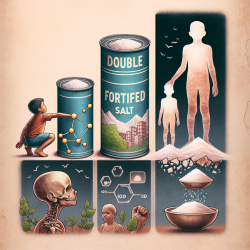Introduction
As practitioners dedicated to improving children's health outcomes, it's crucial to stay informed about the latest research and interventions that can make a difference. One such promising intervention is the use of Double Fortified Salt (DFS), which combines iron and iodine to address deficiencies that significantly impact children's health and development. This blog explores the findings from the research article "Can Double Fortification of Salt with Iron and Iodine Reduce Anemia, Iron Deficiency Anemia, Iron Deficiency, Iodine Deficiency, and Functional Outcomes? Evidence of Efficacy, Effectiveness, and Safety," and discusses how these findings can be implemented to enhance therapeutic practices.
The Impact of Double Fortified Salt
The study conducted a comprehensive review and meta-analysis of 22 studies involving over 52,000 individuals to assess the efficacy and effectiveness of DFS. The findings indicate that DFS significantly improves hemoglobin concentration, reduces anemia, and enhances iron status. These improvements are crucial, especially in children, as iron deficiency and anemia are linked to cognitive impairments and developmental delays.
Key findings include:
- A significant positive effect on hemoglobin concentration with a standardized mean difference of 0.33.
- A reduction in the risk of anemia by 20% and iron deficiency anemia by 64%.
- Mixed results on functional outcomes, highlighting the need for further research.
Implementing DFS in Therapeutic Practices
For speech-language pathologists and other practitioners working with children, incorporating nutritional interventions like DFS can complement traditional therapies. Here are some ways to integrate these findings into practice:
- Education and Advocacy: Educate parents and caregivers about the benefits of DFS and advocate for its inclusion in school meal programs and community health initiatives.
- Collaboration with Nutritionists: Work closely with nutritionists to develop comprehensive care plans that address both speech and nutritional needs, particularly for children at risk of iron and iodine deficiencies.
- Monitoring and Evaluation: Implement regular monitoring of children's nutritional status and cognitive development to assess the impact of DFS and adjust interventions as needed.
Encouraging Further Research
While the current research provides strong evidence for the efficacy of DFS, there are areas that require further investigation. Practitioners can contribute to this growing body of knowledge by participating in or initiating research projects that explore:
- The long-term cognitive and developmental outcomes of children receiving DFS.
- The effectiveness of DFS in diverse populations and settings.
- The optimal formulation and delivery mechanisms for DFS to maximize its impact.
Conclusion
Double Fortified Salt presents a promising opportunity to improve children's health and development outcomes. By integrating DFS into therapeutic practices and encouraging further research, practitioners can play a pivotal role in addressing nutritional deficiencies and enhancing the quality of life for children worldwide.
To read the original research paper, please follow this link: Can Double Fortification of Salt with Iron and Iodine Reduce Anemia, Iron Deficiency Anemia, Iron Deficiency, Iodine Deficiency, and Functional Outcomes? Evidence of Efficacy, Effectiveness, and Safety.










